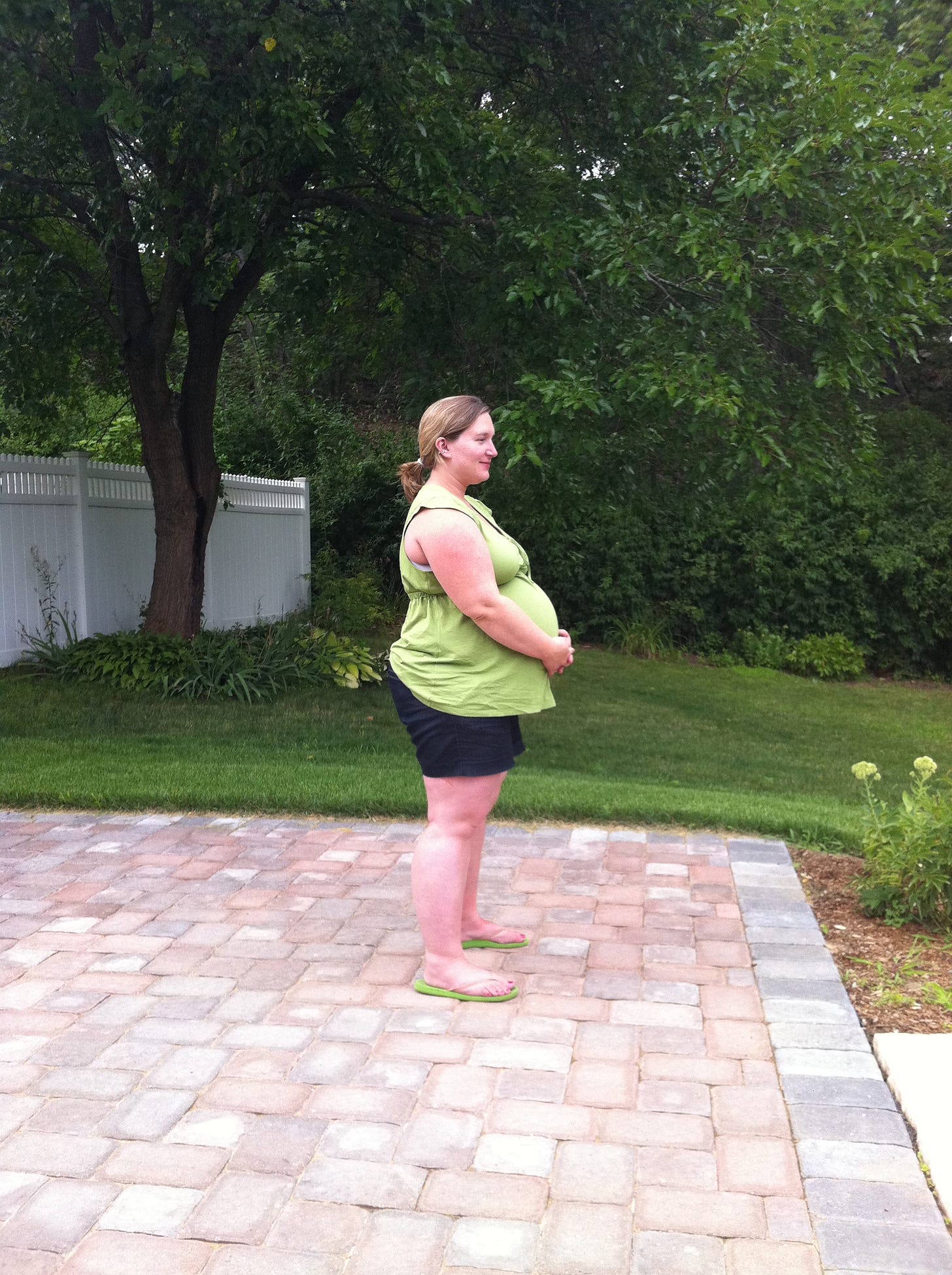How the Black Box of Pregnancy Inspired My First Novel
And numerous opportunities to support When We Were Mothers

Your heart flutters even before you’re fully awake.
You spend the moment before your eyes open trying to place the feeling. But then you remember getting up at 2:37 to pee. You who, under normal circumstances, would roll around in bed for hours, fending off dreams of having to pee in public until the chime of the alarm. But these are not normal circumstances.
You tried to resist taking the test for a couple of days. Testing too early might give you a false negative, and those tests are expensive! (You haven’t yet discovered Dollar Tree.) But you’d already waited so long, and once you had the test in hand you lost control of your limbs and found yourself hunched over the bathroom sink trying to decipher the 3600 square inches of unfolded instructions.
You’d wanted to do some cute announcement for your partner, but you couldn’t wait for that, either. “Look!” you called, dashing from the bathroom to the living room. “It’s faint, but it’s a line!” A line is a line, no matter how faint. That’s what they say on the TTC (trying to conceive) forums.
That was Saturday, and today is Monday, and now that the anxiety of trying to get pregnant is behind you, you’ve got a new anxiety brewing.
How do I know everything is okay?
Every day for your entire life, you’ve trusted your body to do all the things it’s supposed to do. It’s kept you awake and alert, moved you from one place to another, gotten you through calculus class and three triathlons. It even got pregnant within the six months everyone says is normal.
But all of a sudden, you feel a deep distrust that your body is doing anything at all. You can’t see anything yet. Can’t feel anything either, unless you count cramps—which could be a sign of healthy pregnancy but could also signal miscarriage. Miscarriage, you know, happens about a quarter of the time—exponentially higher than the failure rate of any other bodily process you’ve heard of—though it’s not nearly as common after the heartbeat has been detected.
You need to see that heartbeat.
You call the doctor to schedule your first appointment. “When was your last period?” they ask.
You try not to be too obvious about having no clue, but then you remember that you had to pack tampons when you went to Long Island for Alex and Danielle’s wedding. “November 13,” you say, “or somewhere around there.”
“Okay, so that would put you at about five weeks. The doctor will see you when you’re around ten weeks.”
“What? Why?” you say, but you know it’s because if your pregnancy is going to end, it’ll probably be gone by then and the doctor will never have to see you at all.
What the honest hell are you supposed to do for an entire month? How are you supposed to trust that this, the most important of all your body’s duties, will be faithfully executed?
Your skin crawls every minute of every day. Waves of excitement, anxiety, and nausea alternate rolling through you, and you can’t focus on work, television, or any conversation that involves more than logistics. The constant hum of “How do I know?” plays drowns out everything else.
Also, you can’t talk about it to anybody. You’re not supposed to tell people yet, because what if this thing isn’t even real? Most of the time, you’re sure it’s not. The nausea disappears, and you don’t have to get up to pee in the middle of the night, and you can’t feel anything happening inside your body, and you’re certain there is no baby, never was. This was just a mirage, a sick game your hormones were playing on you, and now that your hopes have been raised, they’ll be on their way.
Peace is out of reach until you see that heartbeat, until you know that the baby you’ve been trying not to imagine holding in your arms—lest you be devastated if the unimaginable happens—is real.
This all-too-common experience got my gears turning for the novel, When We Were Mothers. The book is not about pregnancy, not really, but the anxiety of not knowing did start my mind on the path that set the rest of the story in motion.
The story, like most of mine, came from a series of What Ifs stemming out of a real-life thing:
I wish there were a way to know what’s going on inside a pregnant body.
→What if there were a sensor that could measure hormones, heart rate, movement, etc.?
→That would be very cool, but also pretty invasive. An artificial womb would do the same thing.
→Oh, yeah! It probably won’t be long before we can use those to allow premature babies to finish out their incubation.
→And once that’s possible, we’ll develop technology to develop the baby from start to finish! This will help people who can’t conceive naturally or carry a baby to term. And it might be seen as safer—certainly more predictable.
→What if most of the world begins using these artificial wombs?
→And, in a world where medicine is increasingly socialized, what if the government mandates them?
→And what if a group of rebel women wants to take back their right to have children naturally?
That’s where When We Were Mothers begins. Lucinda and her mother, Ruma, are the leaders of an underground group of women determined to take back the right to choose the method in which they give birth. But then, something goes wrong—and they risk being found out by Emeka, a seasoned and by-the-book detective.
There are a lot of reviews online, which say very things like:
Character development is exemplary, and the pacing is magnificent. Don't read this one at bedtime on a work night ... you won't be able to put it down! -Susan
and
This book is important and impactful, gripping and well-written, tightly plotted with a promise that delivers. -Caleb
and, also,
…a compelling narrative full of intrigue, mystery, and heart. The characters feel like real people, even when they use futuristic technology and meet in a secret society. The novel is well written and easy to follow, even during points when the reader is not fully aware of all the details. -The Enchanted Library
In her Beach Reads newsletter for WBUR, Hanna Ali says she appreciated the book’s encouragement of gray thinking, and I think that’s one of the truest purposes of this book, of my life, and of my online work. Nothing is all one thing or the other, hard as the world tries to convince us that it is. Our commonalities can bring us together and help us understand one another, and I hope anyone who reads this book or any of my other work takes that away if nothing else.
Since Hanna’s Beach Reads spot, When We Were Mothers has risen in the Amazon charts, and I’m wondering if you can help keep up the momentum. Here are some things you can do to help an independent (and good, if I do say so myself!) author get her work in the hands of the people who will enjoy it.
Do you enjoy a speculative fiction novel with characters that come alive? A story about the complex relationships between women and among families? A suspenseful cat-and-mouse tale? Pick up your copy of When We Were Mothers for just 5.99 on ebook. If you prefer the paperback version, you can get that, and I’ll sign it the next time I see you! Books make great gifts, too!
Have you read the book? Tell someone you know about it. Have them read the mini-essay above. Let them know what you loved about the book, and encourage them to pick up their own copy! Personal recommendations are one of the biggest drivers of book sales!
Share about the book on social media. Ask your library to carry it on ebook and paperback. Call your favorite radio or TV show or write to your favorite podcast to let them know people are talking about this book and they should be, too! (Bonus points if you have connections to Reese, Jenna, or Oprah 😉)
I know this wasn’t a full essay like you’re used to. But I love writing, and when people buy my books, I get to write more. I’m hoping you’re here because you like reading my work as much as I love writing it, and I thank you for any bit of support you can offer!
Thanks as always for your generous support.
See you soon,




Just read this, Nicci. Catching up on some emails. I am excited to support your work and will purchase your e-book version. I confess I am not usually (ever) a fiction reader, but I absolutely LOVE the "gray thinking" part of your story - and everything you write here, really - because it aligns so much with what real life is all about, anyway.
Pregnancy, or that space between knowing you're definitely NOT pregnant and then thinking you MIGHT be pregnant, is what I tend to call "the space between hope and fear." It's my definition of waiting in the tension for everything in life. I think you might have inspired me to write more on that for my memoir on motherhood, so thank you. :)
I can't wait to read your book. I will have to get it as soon as I can! I related so much to the beginning of this essay, I forgot where it was going! But then I couldn't wait to find your novel because it sounds so intriguing.